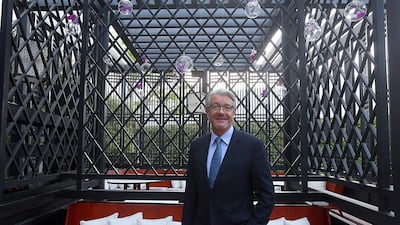Didier Souillat is the executive vice president of restaurants at the Hakkasan Group, which currently operates two gourmet Chinese restaurants in the UAE – one in Dubai and one in Abu Dhabi. Hakkasan, owned by Abu Dhabi’s Tasameem Real Estate, has over 50 restaurants worldwide, including Hakkasan, Sake No Hana and Yauatcha. The Frenchman, 49, cut his culinary teeth as business development manager of food and restaurants at Selfridges & Co from 1998 to 2002, then moved over to Harrods to become their food halls and restaurants director. He has worked for Hakkasan, which is stepping up its international expansion next year by adding new establishments in the US and Indonesia, for the last five years.
How do you decide where to open a new outlet?
It’s about finding the right partner and location in a city where there’s enough footfall in terms of tourists, locals, and business people to be able to have the average spend that we need. With Dubai 2020 coming up soon, the government here is expecting 20 million visitors a year so Dubai is the place to be, there’s no doubt. Everything that’s being done in Abu Dhabi for tourism, art and culture means a big influx of tourists in Abu Dhabi, too.
How has Hakkasan’s presence in this region grown?
We opened the first Hakkasan in the Arabian Gulf in Abu Dhabi in 2010 because our holding company was based in Abu Dhabi so we thought it would be wise to open the first one where we operate from. That was at Emirates Palace, which is such a great partner and venue. Following that we opened in Dubai in 2011 at Jumeirah Emirates Towers. In 2013, we opened with the Alfardan family at the St Regis Resort in Doha.
Are there plans for further expansion in the region?
We’ve just announced our collaboration with the Kerzner and Seven Holdings from Bahrain to open a Hakkasan at the One and Only in Bahrain. We are at the early stage of our relationship so no dates are available yet.
How about in the UAE?
I do not think we’ll be opening more Hakkasans in the UAE, but never say no. The Hakkasan Group has a multitude of brands – in the restaurant sector. One is Yauatcha, our all-day dim sum teahouse. We have two in London and four in India, and we’re exploring the market now in Abu Dhabi and Dubai to see the implementation of that concept here.
Does Hakkasan’s menu vary from country to country?
It’s about 80 per cent the same everywhere. Our core bites are the same and 20 per cent changes according to local supplies and local trends. We try to source local fish and vegetables. This gives a bit of freedom and flexibility to the chef to be more creative, while following the Hakkasan guidelines of course.
Which dishes are unique to this region?
Steamed red snapper in Assam sauce, roasted mala chicken with cucumber and cloud ear mushroom, wok-fried sweet and spicy scallop, and venison chop with honey jasmine sauce. We created a special dish called jasmine tea-smoked Wagyu beef ribs for the UAE market. The dish was so popular that people from the UAE were coming to the UK and complaining ‘how come you don’t have those Wagyu beef ribs?’ So we imported the creation into the UK and now we export it to all the other Hakkasans.
Why do you think Hakkasan has caught on in the Gulf region?
It is a social dining concept – a lot of small plates that are meant for sharing. Since we started in this part of the world five years ago, social dining has become stronger and stronger. The population in the UAE really likes to share, so our sharing concept suited the palate. You have the fine dining quality of the dishes but it’s not fine dining as such, it’s much more social. There are no white tablecloths at Hakkasan. Our culture of eating late and finishing late really suits the culture here too.
What is the most common mistake brands make in the restaurant industry?
Developing too quickly. Restaurants need a lot of investment and everything has to be done with the long term in mind. Return of investment in two years is not going to happen with a high-level concept. It’s an investment in the future, you have to be patient, nurture the brand and invest in quality. And never ever take short cuts
Did you learn those lessons while working at London’s Harrods and Selfridges?
Absolutely. I had some pretty tough bosses over there. It was all about luxury and quality, and there was no time for complacency. With Mr (Mohamed) Al Fayed (former owner of Harrods) and Selfridges before that, the experiences I had were very helpful in learning to develop a luxury brand and keep the standards high.
The two London Hakkasans have been awarded a Michelin star each – how did the brand attain this marker of quality?
I believe the Michelin guide gives you the first star for being consistent at the food you deliver at a high level. The guide is not present in the UAE. Some restaurants in the UAE call themselves Michelin-star restaurants because they have the star somewhere else around the world. But they don’t officially have one in the UAE.
business@thenational.ae
Follow The National's Business section on Twitter

